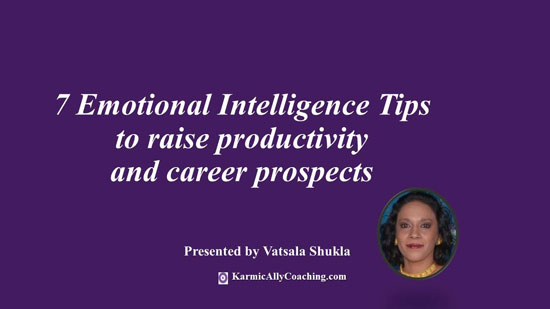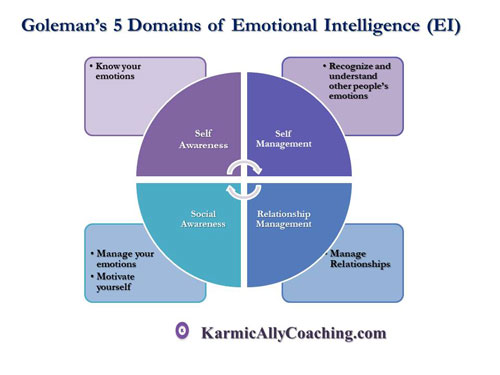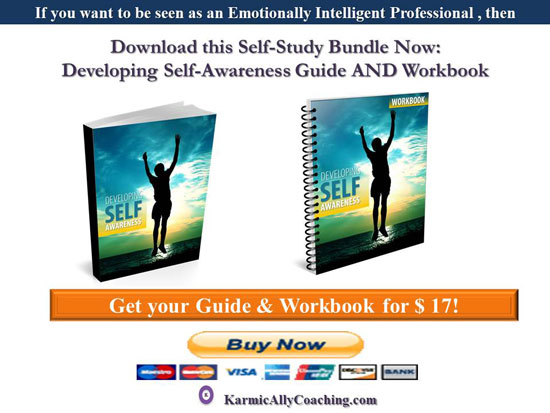This post has already been read 649 times!
Resources Mentioned in video:
Developing Self Awareness Bundle
Emotional Intelligence: you need to apply authentic kind of Empathy
The Effects of Emotional Intelligence on Productivity
References:
Holtz, O. (2020). Virtual Team Functioning: Modeling the Affective and Cognitive Effects of an Emotional Management Intervention. Group Dynamics, 24(3), 153–167.
Gabriel, K. (2020). Are Coworkers Getting Into the Act? An Examination of Emotion Regulation in Coworker Exchanges. Journal of Applied Psychology, 105(8), 907–929.
Prefer to Read? Here’s the full transcript

As more studies show Emotional Intelligence improves employee productivity and job performance, it becomes a more coveted skill in the office and one that every serious professional needs to develop.
So, first things first, let us quickly recap.
What is Emotional Intelligence?
A quick definition is that Emotional intelligence is when you can understand the emotions of yourself and others and manage your own feelings well. It shows a balance between intelligence and self-awareness.
I go into great depth in this in one of my blog posts on emotional intelligence and being able to apply authentic kind of empathy.
But in a nutshell, these are the four categories where your emotional intelligence will be assessed.
So let us quickly go through this before we get into the tips.
4 categories of Emotional Intelligence

First one is Self-Management where you are able to think clearly in situations where you feel stressed, anxious, or angry. And Self-Management indicates being able to separate yourself and how you should act from your emotions.
In other words, for example, even if you are really irritated by a co-worker, you somehow manage to count to ten if necessary, and you give a calm response rather than screaming and shouting even if that is what you want to do.
Self-Awareness. This is going to help you to change negative habits, thoughts, or behavior. And when you have a high level of self-awareness, you can recognize how your beliefs and emotions affect your thoughts and behavior.
Then we have Social Awareness. Now this, one way of looking at this is your ability to “read the room.” You can understand what others need to feel comfortable, as well as see social dynamics at play.
Social Awareness indicates how well you pick up on social cues or needs. One way of looking at it is, when you walk into a room can you pick up the ambiance over there? Is it stressed or tense?
Many people say that is having empathy or even psychic abilities at some point, but the thing is, you’re aware enough to understand what’s going on even if nothing is being said.
And then there is Relationship Management where you manage conflict well, you work well with others, and you develop positive relationships overall. And, the best part is, relational management indicates good interpersonal skills and that is something you really do need if you wish to climb the corporate ladder.
Emotional Management Affects Productivity
So, before we get into the tips, let’s also look at some of the evidence about how Emotional Management is affecting productivity.
The Effects of Emotional Intelligence on Productivity (2018)
There is a thesis paper called The Effects of Emotional Intelligence on Productivity and I’ll share a link to see the study later.
But essentials of that study were that emotional intelligence is becoming an essential area of study to determine a person’s potential for overall success as well as success in the workplace.
And it also pointed out that although non cognitive skills are not always a factor that leaders use in determining workplace efficiency, but those skills can impact productivity.
Now this was a study done, it was a single case study in order to explore the impact of these non-cognitive skills and the perception administrators and employees have regarding skills that are critical to their jobs and work performance.
The conceptual framework that was used for this study was that of emotional intelligence theory authored by Daniel Goleman in 1995, which studied personality qualities.
The focus of this study comprised of 6 skills: communication, self-confidence, teamwork, work ethics, problem-solving ability, and leadership.
Several patterns and themes emerged relating to the effects of emotional intelligence on job performance and productivity. In fact, the findings from this study can impact future of non-cognitive skills in the work environment and could positively impact social change.
Organizational leaders could use the results to develop strategies that would enhance their decision-making process and develop tools to promote employee production and productivity.
Increases team cohesion
From there, there was another study done by the University of Valencia in Spain which demonstrated that increased team cohesion happened when there is emotional intelligence amongst the participants because of the synergy effect. This produces enhanced team task performance and has a positive effect on the motivational processes within the team, thus leading to more team engagement. In other words, a team can do better than as expected.
Improves co-worker relationships
It also improves co-worker relationships. Now there is another study which was done in 2020 which focused on the role of emotional regulation in exchanges between co-workers. And there, of course where deep actors refer to employees who “are driven to regulate their emotions with co-workers for pro social reasons”.
And the employees who were able to do that have the ability to build strong relationships with their co-workers and that in effect demonstrates benefits in productivity.
Conclusions from studies on workplace Emotional Intelligence
So the conclusions that I’d like to quickly sum up from these studies is that firstly,
Emotional intelligence is an asset.
The studies have shown that emotional intelligence training improved employee productivity. And that people who are emotionally intelligent can come up with solutions from a holistic perspective.
So now, are you interested in improving your emotional intelligence so that you can excel at work?
Good. Here are my tips.
Tips to build your Emotional Intelligence
The first one is Practice Self-Awareness and here are four ideas that you can use.
You can do reflections in journals. You can also notice when you react to something on autopilot. Think about the feedback you receive and practice seeing things from other people’s point of view too, not just your own.
Following from the self-awareness, learn to receive criticism with grace and use criticism as an opportunity to learn and grow.
You should also likewise see conflict as an opportunity to learn and understand more about others because conflict is going to happen, whether you like it or not. Whenever you have two people there will be, many times differences of opinion and it all comes down to who is able to handle it better and stay in control.
And then of course, learning to “read the room.”
Now here’s some tips for you.
How well do you pick up on the feelings of people around you? It’s the same thing I said when you walk into the room can you pick up a sense of what’s going on and from there do you know who to go to when you need a solution?
And what “unwritten rules” do people follow at your workplace?
Being able to read the room positions you as a change maker. So, it’s in your interest to start observing people and also assessing how they react so that you can come across better.
And then, learn to listen to others. Don’t do all the talking yourself. Make space for others as well. And in meetings many times people think that oh you know, if they hog all the talk time they are going to come across as you know being very intelligent. That’s not quite true.
You should try to listen in meetings and make an effort to ask people what they think. That’s what emotional intelligence is about – you also care about others.
But that of course doesn’t mean that you don’t speak up and express yourself. Do not be afraid to pitch your out-of-the-box ideas or make sure your opinions get heard!
We’re not saying just listen and keep quiet. We’re saying listen and also speak up.
And work to people’s strengths. Now you will have lots of people with different strengths and different kinds of talents. They may also have shortcomings. You have to learn to be flexible to the different types of people who make up your team.
And, to position yourself as a really good candidate for a further leadership role learn to create an environment for each person to thrive, be engaged and innovative. Because in today’s modern times, a leader is as good as his people are.
And the first step of course is to develop your self-awareness and I’ve got a simple self-study bundle where there’s an eBook with developing your self-awareness guide as well as the workbook where you can note down your findings and I encourage you to download it.
Final Words
So, my final words on the topic are that people with higher emotional intelligence have an easier time managing their stress levels, building better relationships, and reading the room.
Prowess in managing your own stress levels means that you can calmly lead a team through high-stress situations. That’s what influential leaders do. When you build better relationships it can help keep your team members engaged and motivated. And when they are motivated, they work better. They are more productive.
And being able to read the room means that you can know the right person to approach when you’re tackling a problem, or you learn to take action when you notice that a colleague feeling stressed. You know exactly when to step in before things spiral out of control.
So, I suggest that you try these suggestions for size and then let me know. And as a parting question, wouldn’t life be great with effortless stress management, better relationships, and being able to “read the room”?
Especially if it helps you improve your productivity as well as that of others in your workplace.




 I adhere to the Certified Coaches Alliance Code of Ethics and Standards. A copy is available on request.
I adhere to the Certified Coaches Alliance Code of Ethics and Standards. A copy is available on request.
 Let's Talk through the Connect Form:
Let's Talk through the Connect Form: